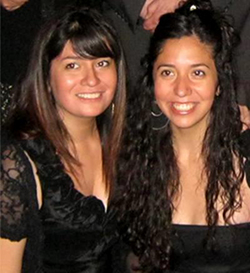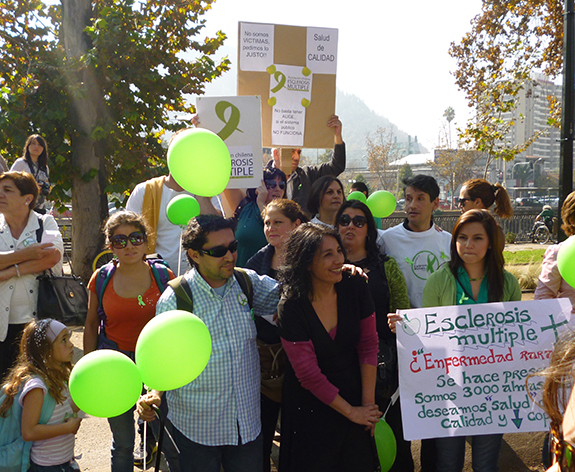
Multiple sclerosis: we need fair treatment across the world
This is an updated post from our archives. Anisha Gangotra shares her experiences volunteering in Chile, working with organizations supporting people with multiple sclerosis (MS). She highlights the challenges faced by MS patients in Chile, including difficulties in obtaining a diagnosis and disparities between public and private healthcare systems. Anisha’s journey underscores the importance of family support and raises awareness about global inequalities in MS treatment and care.
Global Disparities in Multiple Sclerosis Treatment
Multiple sclerosis (MS) affects people worldwide, but access to treatment varies significantly across regions. Key factors contributing to these disparities include:
- Socioeconomic Status: Individuals in lower-income countries often lack access to licensed MS therapies, limiting treatment options.
- Healthcare Infrastructure: Limited availability of specialized healthcare professionals and facilities can delay diagnosis and treatment.
- Awareness and Education: A lack of public awareness about MS may lead to misdiagnosis or delayed treatment.
Efforts to address these disparities are ongoing. For instance, the NICE guidelines in the UK provide comprehensive recommendations for MS management, aiming to standardize care and improve outcomes. Additionally, organizations like the Multiple Sclerosis International Federation (MSIF) work globally to advocate for equitable access to MS treatments and support services.
By increasing awareness and supporting international initiatives, we can contribute to reducing these disparities and improving the quality of life for people with MS worldwide.
Original post follows:
What effects does multiple sclerosis have on a family halfway around the globe? Anisha Gangotra sought answers by dedicating two months as a volunteer in Chile. She worked with organisations, including Corporación Chilena de Esclerósis Múltiple, akin to the Multiple Sclerosis Society. At 30, she shares a conversation with Trishna Bharadia about her enlightening adventure.
Anisha Gangotra’s time in South America was a life-changing experience, and you can tell. When she speaks about it her eyes light up and her face becomes animated. While she spent some of her five-month trip exploring the continent’s beautiful landscape and culture, via trips to Brazil, Argentina and Bolivia, it was her two-month stay in Chile that brought her much closer to home than she had imagined.
“I always wanted part of my trip to be dedicated to voluntary work,” she explains, “and as my stay in Chile was right at the end, it made sense to undertake it there. I was given some contacts by people I knew in the UK and when I arrived in Santiago with just my backpack and three months of travelling behind me, I set about researching what help was needed at the various charities that interested me.”
 Volunteering for the MS Society was a logical step, as Anisha has already been heavily involved with Asian MS, the UK MS Society’s support group for Asians. Her connection with MS stems from having two sisters, who are identical twins, and a cousin with the condition. She was keen to talk to people with and affected by MS in Chile to see whether they face similar issues when coming to terms with their diagnosis, and what life is like for them, given the very different health systems and cultures.
Volunteering for the MS Society was a logical step, as Anisha has already been heavily involved with Asian MS, the UK MS Society’s support group for Asians. Her connection with MS stems from having two sisters, who are identical twins, and a cousin with the condition. She was keen to talk to people with and affected by MS in Chile to see whether they face similar issues when coming to terms with their diagnosis, and what life is like for them, given the very different health systems and cultures.
Difficult path to diagnosis
“When Natalia was diagnosed in 2010, aged 25, Mariluz told me that it was one of the worst days ever for her family. They had already encountered many obstacles in the path to a diagnosis. Initially, Natalia was being seen within the public health system, but they faced long queues, badly maintained hospital rooms and at times were sharing the waiting room with much poorer people who were using it just as somewhere to sleep.
Consequently, they switched to the private system, where they had a much better experience and felt as though Natalia’s case was being treated as the most important in the world. Their mum was able to stay with Natalia all day and all night if she could while Natalia underwent test after test. This family closeness became even stronger once Natalia received her diagnosis, as they knew that is was something that would affect all of them in some way.”
Coming to terms with multiple sclerosis
Anisha said that when both her own sisters were diagnosed, the relationship changed in many ways, particularly as one of her sisters was still living at home. Even though she’s younger than her sister, there were times when she took on the role as a carer if her sister fell ill.
Mariluz’s experience was similar, although she is older than Natalia. “Mariluz told me that at the start she did not know how to come to terms with her sister being in daily pain and the fact that her life had changed forever. She found it hard to enter the ‘MS world’ and to accept the fact that at times her sister wanted to distance herself from the family.
However, with time, there has been a greater understanding, and now Mariluz says she has made her own future intrinsically tied in with her sister’s. Knowing that she must be physically and emotionally healthy to face any situation, she understands the importance of staying positive so that she can always be there to support Natalia.”
Pressing for change
“Mariluz also understands the financial implications of MS. Natalia experienced periods of not having paid work, therefore, she knows there may be times when she has to financially support Natalia. I was surprised to hear from Mariluz that, while there is a system called ‘AUGE,’ where patients with certain illnesses are able to benefit from reduced treatment costs, consultations and examinations, there is no financial help for relatives that care for a person with MS. Therefore, the financial help being given to Natalia by her parents is coming from their own pockets.”
Anisha adds that unlike in the UK, where there is a certain level of protection for employees with MS due to the Equality Act, in Chile there are very few safeguards to help people to stay in work. “People with certain chronic conditions can apply for a special medical licence, which is renewable every three years and prevents employers from unfairly dismissing someone who has MS. However, it is not unknown for people to be sacked during the renewal process before their new licence has been approved.”
Faced with these sorts of challenges, there is a great deal of mobilisation in Chile when it comes to pressing for changes to the welfare and health systems. Anisha attended one such march, which was to show support for the AUGE system and highlight the help it offers for people with chronic conditions. Patient groups from across Chile and representing various conditions were present, including MS, crohn’s and colitis, vasculitis and coeliac disease.
It gained press coverage and Anisha describes the approach as being “very collective and supportive.” She added: “We marched through Santiago for a whole afternoon and there was a festival-like atmosphere to the event, with lots of music and even the presence of Chilean celebrities to help raise awareness.” She goes on to say how “it really brought it home to me that it doesn’t matter where you’re from or what condition you have, if change needs to happen then being one extra voice can really help to lend weight to a cause.”
Facing the future together
While Anisha’s time in Chile was relatively short, she said that meeting Mariluz’s family really helped her to feel at home there. “Despite the difficulties they’ve faced, Mariluz, Natalia and their whole family still try to maintain a positive outlook. Just by coincidence, a year before her sister was diagnosed, Mariluz read an article about MS and learnt a little about the symptoms.
In parallel, she had started a kind of ‘movement for happiness,’ in which she would incorporate a positive way of living into her daily life, trying to encourage her friends and family to look at life and the world from a more positive perspective. The one thing that really struck me and left its mark was how Mariluz considered the love and presence of each member of the family as important in order to give power and strength to one another.”
By Trishna Bharadia
Check out…
• Gliding with MS
• Disabled beauty pageants: why don’t we hear about them?
• Making waves: taking the adult respite campaign to Parliament
Get in touch by messaging us on Facebook, tweeting us @DHorizons, emailing us at editor@disabilityhorizons.com or leaving your comments below.
Originally posted on 20/10/2014 @ 12:30 am
